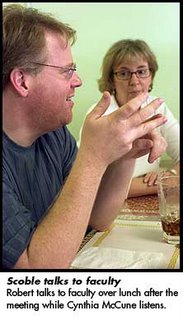It's rare to see a full-blown spiral of silence come undone. But that's exactly what happened this week.
After years of being squelched, opponents of the Iraq war found their voice in
Rep. John Murtha, D-Pa., an ex-Marine and a Vietnam veteran who proved to be unsmearable. His blunt critique of the Iraq war, and his call for a quick pull-out, provided the
tipping point, making it safer for others to wade into the treacherous waters of open criticism of the war.
Thus, the tightly wound spiral of silence on Iraq, which has held public criticism of the war at bay for three years, started to come undone.
So, what's all this about a spiral?
The
Spiral of Silence is a theory of media and public opinion developed by in the 1980s by
Elisabeth Noelle-Neumann. In essence, it says that most people would rather keep their opinions to themselves than risk being perceived as being out of step with the mainstream, or risk being ostracized for their views. And the fewer contrary views are heard, the more people perceive themselves to be in the minority…and the fewer of them are willing to speak up. Thus, the
spiral of silence tightens.
Of course, spirals of silence don't just happen. They usually have some help. In this case, the Bush administration did a masterful job of suggesting -- sometimes subtly, sometimes with all the subtlety of a sledge hammer -- that it was unpatriotic to question the Iraq war or its conduct.
For the most part, it worked. After all, who wants to be accused of hurting troop morale or of aiding and abetting the enemy? So most criticisms of the war were muted or silenced. People with opposing views mostly squelched themselves. And the Bush administration was able to shrug off the criticisms of lonely liberals and people like
Cindy Sheehan, the Vacaville woman who lost a son in the war, as being partisan attacks or hysterical outbursts.
Then Murtha spoke out. His comments proved to be the tipping point…and the spiral came tumbling down.
You could watch the administration's desperate attempts to restore the spiral of silence: the initially harsh response from the president, the now-predictable accusations of disloyalty from the vice president, and even name-calling from a
junior congresswoman who tried to imply that Murtha was a coward.
This time, though, it didn't work. They'd overplayed their hand. No one bought the image of Murtha as a traitor or a coward. The congresswoman,
Rep. Jean Schmidt, apologized; the
president, speaking in China,
tempered his tone…he respects Murtha, of course, and his right to say what he thinks, he just doesn't agree with him.
Suddenly, it was safe to go in the waters again…and critics of the Iraq war began speaking their minds…and the U.S. Congress began discussing how best to get out of Iraq.
